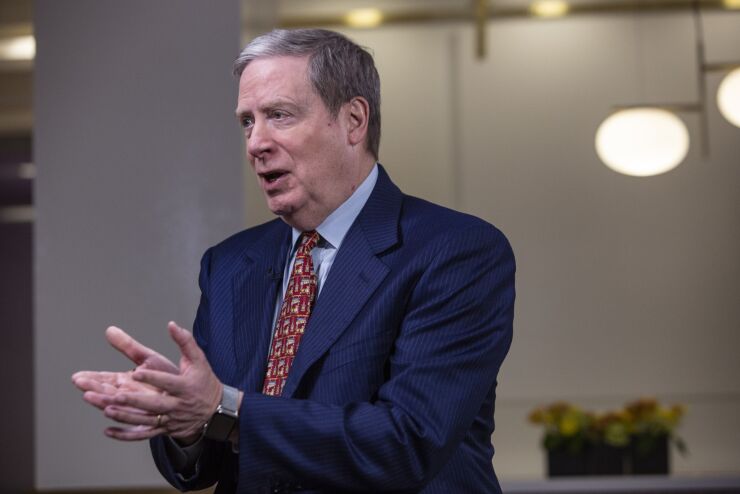Some of the biggest money managers are vexed by the same paradox troubling everyone else:
Any number of looming threats could bring the historic rally in U.S. equities to a screeching halt, top hedge fund and mutual fund managers said. They include uncertainty over school re-openings,
While the S&P 500 has surged more than 50% from its March low, that happened with unemployment in double digits and the federal government struggling to contain COVID-19. The equity rally also has lifted the index’s price-to-earnings ratio to 26, compared with an average of 18 over the past decade. All of this leaves some market insiders wary of calling this a recovery.
“There’s this massive disconnect between fundamentals and markets,” said Brian Payne, investment officer at the Teachers’ Retirement System of Illinois. “There’s just too much capital chasing investments, the Fed is flooding markets and that leverage isn’t going to the real economy. As we approach the election and concerns over a ‘blue sweep’ grow, that could be the inflection point where people’s bullish sentiment turns bearish.”
Chris Rokos’s multibillion-dollar hedge fund is modestly bullish in the short-term but sees volatility ahead, as the market underestimates the potential for bigger moves over the next couple of months.
To be sure, dour predictions have been piling up for months. On May 12, during a webcast held by the Economic Club of New York, Stan Druckenmiller said the risk-reward calculation for equities was the worst he’d seen in his career. The S&P 500 has climbed 18% since then, and Druckenmiller later said he was “far too cautious.”
And while many investors are vocal in their skepticism, their views don’t perfectly accord with the behavior of professional managers as a whole. The speed of the recovery in stocks has made the risk of missing out particularly pronounced this year, forcing fund managers out of cash and pushing measures of positioning toward historically bullish levels.
- Concerns about virus fallout and the upcoming presidential election have kept clients’ long-term investing exuberance in check, research shows.Sponsored by ADP
-
While the money held in delisted products is a fraction of the overall exchange-traded market, analysts warn those billions could be time bombs.
August 18 -
A significant push to use the precious metal as portfolio insurance may create a self-reinforcing spiral that upends its appeal as a hedge.
August 6
Shuttered Schools
Still, several prominent money managers are sounding the alarm. With children learning remotely, the impact on working parents could “be as disruptive to the labor market as a small to medium-size recession,” as they may be forced to reduce work hours or quit their jobs, U.K. hedge fund Brevan Howard Asset Management said in a note to clients this month.
“Investors need to add schools to their usual dashboard of economic indicators,” Brevan Howard said. “What’s happening with education has the potential to be as important as any other metric.”
Then there’s the race for a vaccine. It’s possible that a reliable one could take longer to develop than hoped, or that parts of the population will resist taking it, said Roger Aliaga-Diaz, chief economist for the Americas at Vanguard.
The market expects it to arrive by the end of the year, “but production and distribution could come much later than people think,” he said. “That would be a negative surprise.”
Tech Tonic
Strong returns for a handful of mega-cap stocks, including Apple, Microsoft and Amazon.com, account for an outsize portion of the S&P 500’s gains this year. Tech giants are thriving as quarantined consumers rely more than ever on mobile devices and delivery services. Apple made history Wednesday when its market value eclipsed $2 trillion, a first for an American company.
But trade tensions with China, antitrust investigations and the potential for more regulation if Democrats sweep to power in November could trigger a tech selloff.
Take, for example, President Trump’s executive orders targeting Chinese-owned messaging app WeChat and
The WeChat broadside was “the biggest attack on a China technology company since Huawei” and could spur retaliation against Apple or Tesla, Graticule Asset Management, a $2.6 billion macro hedge fund, said in a letter to investors this month.
The 20 top-performers have generated gains well over 50% in the first seven months of the year.
“There is a long-term risk that we’ll see a bifurcation of the global technology industry,” said Russ Koesterich, a portfolio manager and member of BlackRock’s Global Allocation team. “Any change in the regulatory regime could certainly impact tech companies.”
Inflation Fears
Inflation fears are growing amid unprecedented stimulus from the Fed, even as policy makers see disinflation as a greater threat from the pandemic, according to the minutes of the Federal Open Market Committee’s July meeting.
David Einhorn’s Greenlight Capital is already wagering on ways to profit from rising inflation by establishing “a new, large macro position” in 2-,5- and 10-year inflation swaps, the hedge fund firm said in a recent letter to investors.
The market isn’t fully pricing in the potential drawn-out effects of an inflationary environment, according to Katy Kaminski, chief research strategist at AlphaSimplex Group.
“Inflation is something we aren’t used to,” Kaminski said in an interview. “Most people are a little tentative about it but those are long-term shocks.” — Additional reporting by Nishant Kumar, Chris Nagi and Jeremy Herron







